有关地名的英语成语典故
- 格式:pdf
- 大小:111.21 KB
- 文档页数:2
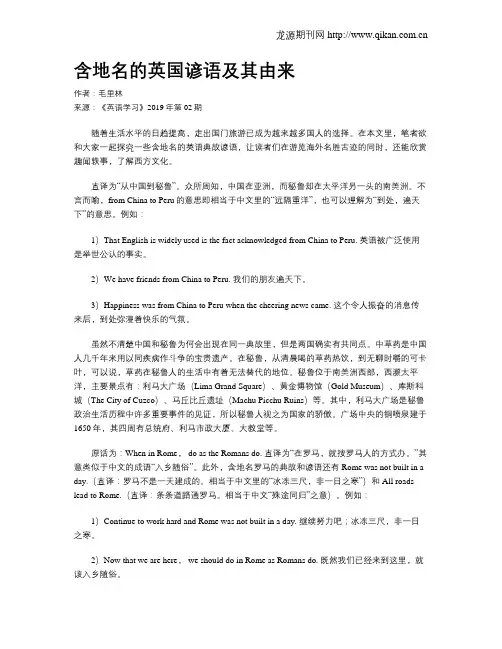
含地名的英国谚语及其由来作者:毛里林来源:《英语学习》2019年第02期随着生活水平的日趋提高,走出国门旅游已成为越来越多国人的选择。
在本文里,笔者欲和大家一起探究一些含地名的英语典故谚语,让读者们在游览海外名胜古迹的同时,还能欣赏趣闻轶事,了解西方文化。
直译为“从中国到秘鲁”。
众所周知,中国在亚洲,而秘鲁却在太平洋另一头的南美洲。
不言而喻,from China to Peru的意思即相当于中文里的“远隔重洋”,也可以理解为“到处,遍天下”的意思。
例如:1)That English is widely used is the fact acknowledged from China to Peru. 英语被广泛使用是举世公认的事实。
2)We have friends from China to Peru. 我们的朋友遍天下。
3)Happiness was from China to Peru when the cheering news came. 这个令人振奋的消息传来后,到处弥漫着快乐的气氛。
虽然不清楚中国和秘鲁为何会出现在同一典故里,但是两国确实有共同点。
中草药是中国人几千年来用以同疾病作斗争的宝贵遗产。
在秘鲁,从清晨喝的草药热饮,到无聊时嚼的可卡叶,可以说,草药在秘鲁人的生活中有着无法替代的地位。
秘鲁位于南美洲西部,西濒太平洋,主要景点有:利马大广场(Lima Grand Square)、黄金博物馆(Gold Museum)、库斯科城(The City of Cuzco)、马丘比丘遗址(Machu Picchu Ruins)等。
其中,利马大广场是秘鲁政治生活历程中许多重要事件的见证,所以秘鲁人视之为国家的骄傲。
广场中央的铜喷泉建于1650年,其四周有总统府、利马市政大厦、大教堂等。
原话为:When in Rome, do as the Romans do. 直译为“在罗马,就按罗马人的方式办。
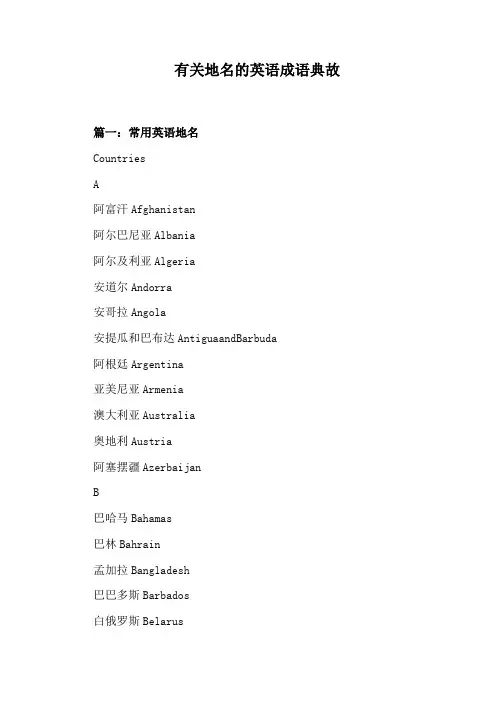
有关地名的英语成语典故篇一:常用英语地名CountriesA阿富汗Afghanistan阿尔巴尼亚Albania阿尔及利亚Algeria安道尔Andorra安哥拉Angola安提瓜和巴布达AntiguaandBarbuda阿根廷Argentina亚美尼亚Armenia澳大利亚Australia奥地利Austria阿塞摆疆AzerbaijanB巴哈马Bahamas巴林Bahrain孟加拉Bangladesh巴巴多斯Barbados白俄罗斯Belarus比利时Belgium/Xtrapage伯利兹Belize贝宁Benin不丹Bhutan玻利维亚Bolivia波斯尼亚和黑塞哥维那BosniaandHerzegovina 博茨瓦纳Botswana巴西Brazil文莱Brunei保加利亚Bulgaria布基纳法索BurkinaFaso布隆迪BurundiC柬埔寨Cambodia喀麦隆Cameroon加拿大Canada佛得角CapeVerde中非CentralAfricanRepublic乍得Chad智利Chile中国China哥伦比亚Colombia科摩罗Comoros刚果(金)Congo(Congo-Kinshasa)刚果Congo哥斯达黎加CostaRica科特迪瓦Coted'Ivoire克罗地亚Croatia古巴Cuba塞浦路斯Cyprus捷克Czech/前捷克斯洛伐克FormerCzechoslovakia D丹麦Denmark吉布提Djibouti多米尼克Dominica多米尼加DominicanRepublicE东帝汶EastTimor厄瓜多尔Ecuador埃及Egypt赤道几内亚EquatorialGuinea厄立特里亚Eritrea爱沙尼亚Estonia埃塞俄比亚Ethiopia欧洲联盟EuropeanUnion(EU)F斐济Fiji芬兰Finland法国FranceG加蓬Gabon冈比亚Gambia格鲁吉亚Georgia德国Germany/前东德FormerEastGermany 加纳Ghana希腊Greece格林纳达Grenada危地马拉Guatemala几内亚比绍Guinea-Bissau几内亚Guinea圭亚那GuyanaH海地Haiti洪都拉斯Honduras匈牙利HungaryI冰岛Iceland印度India印度尼西亚Indonesia伊朗Iran伊拉克Iraq爱尔兰Ireland以色列Israel意大利ItalyJ牙买加Jamaica日本Japan约旦JordanK哈萨克斯坦Kazakhstan 肯尼亚Kenya基里巴斯Kiribati朝鲜Korea(North)韩国Korea(South)科威特Kuwait吉尔吉斯斯坦Kyrgyzstan L老挝Laos拉脱维亚Latvia黎巴嫩Lebanon莱索托Lesotho利比里亚Liberia利比亚Libya列支敦士登Liechtenstein 立陶宛Lithuania卢森堡LuxembourgM马其顿Macedonia马达加斯加Madagascar马拉维Malawi马来西亚Malaysia马尔代夫Maldives马里Mali马尔他Malta马绍尔群岛MarshallIslands 毛里塔尼亚Mauritania毛里求斯Mauritius墨西哥Mexico麦克罗尼西亚Micronesia摩尔多瓦Moldova摩纳哥Monaco蒙古Mongolia摩洛哥Morocco莫桑比克Mozambique缅甸MyanmarN纳米比亚Namibia北大西洋公约组织NorthAtlanticTreatyOrganization(NATO)瑙鲁Nauru尼泊尔Nepal荷兰Netherlands新西兰NewZealand尼加拉瓜Nicaragua尼日尔Niger尼日利亚Nigeria挪威NorwayO阿曼OmanP巴基斯坦Pakistan帕劳Palau巴勒斯坦Palestine巴拿马Panama巴布亚新几内亚PapuaNewGuinea巴拉圭Paraguay秘鲁Peru菲律宾Philippines波兰Poland葡萄牙PortugalQ卡塔尔QatarR罗马尼亚Romania俄罗斯Russia/前苏联FormerUSSR卢旺达RwandaS圣基茨和尼维斯SaintKitts-Nevis圣卢西亚SaintLucia圣文森特和格林纳丁斯SaintVincentandtheGrenadines 萨尔瓦多ElSalvador萨摩亚Samoa圣马力诺SanMarino圣多美和普林西比SaoTomeandPrincipe沙特阿拉伯SaudiArabia塞内加尔Senegal塞舌尔Seychelles塞拉利昂SierraLeone新加坡Singapore斯洛伐克Slovakia斯洛文尼亚Slovenia所罗门群岛SolomonIslands索马里Somalia南非SouthAfrica西班牙Spain斯里兰卡SriLanka苏丹Sudan苏里南Suriname斯威士兰Swaziland瑞典Sweden瑞士Switzerland叙利亚SyriaT塔吉克斯坦Tajikistan坦桑尼亚Tanzania泰国Thailand多哥Togo汤加Tonga特立尼达和多巴哥TrinidadandTobago 突尼斯Tunisia土耳其Turkey土库曼斯坦Turkmenistan图瓦卢TuvaluU乌干达Uganda乌克兰Ukraine阿拉伯联合酋长国UnitedArabEmirates英国UnitedKingdom/北爱尔兰NorthernIreland联合国组织UnitedNationsOrganization(UNO)乌拉圭Uruguay美国UnitedStatesofAmerica(USA)/波多黎各PuertoRico乌兹别克斯坦UzbekistanV瓦努阿图Vanuatu梵蒂冈VaticanCity委内瑞拉Venezuela越南Vietnam(formerlyNorthVietnam)/前南越FormerSouthVietnamY也门Yemen/前北也门FormerNorthYemen/前南也门FormerSouthYemen南斯拉夫Yugoslavia/前南斯拉夫FormerYugoslavia篇二:有关地名成语上有关地名的成语(上)1.五湖四海:五湖指波阳湖、洞庭湖、洪择湖、太湖、巢湖五大湖泊;四海指东海、西海、南海、北海。
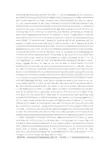
during the warring states period(475-221b.c.),prince mengchang of the state of qi was fond of having various kinds of people as his hangers-on,the number of whom was said to have amounted to three thousand.never refusing anyone who came to hime,he let the talented people do what they could and also offered food and lodging to the mediocre.once,followed by his hangers-on,prince mengchang was sent on a diplomatic mission to the state of qin.attermpting to make him prime minister of the state of qin,king zhao of the state of qin kept hime from leaving. not daring to offend the king,prince mengchang stay here.he is a person of royal lineage,and has feud and family back in the state of qi,how could he serve the state of qin heart and soul?the king thought it plausible,and changed his mind.he put prince mengchang and his hangers-on under house arrest,waiting to find an excuse to kill them.the king had an imperial concubine on whom he doted most,and he never refused her anything,prince mengchang sent a man to her for help.the concubine promised to help if she could have the unique white fox fur coat of the state of qi as her reward.prince mengchang was troubled,for he had already given it to the king of the state of oin as a gift when he arrived here.just then,one of the hangers-on said,i can manage to get it .h he left immediately.it turned out that this man was a skilled burglar who used to enter horses through the hole for dogs in the wall.he made an investigation first,and learned that the king was too fond of the fox fur coat to wear it and that the coat was kept in the choice storeroom in the palace.eluding the patrol,he found his way easily in the moonlight into the storeroom and got the fur coat out.seeing the coat,the concubine was extremely pleased,she tried every means to talk the king into giving up the idea of killing prince mengchang.the king also planned to give a farewell dinner to prince mengchang two days later before sending him back to the state of qi..but prince mengchang did not dare to wait two more days.mounting the horses,he and his men sped stealthily eastward that very night.it was just midnight when they arrived at the hangu pass(in today's lingbao county in henan province,which was the east gate of the state of qin).according to the laws of the state of qin,the gate of the pass should not be opened until cocks crew in the morning.but how could they crow at midnight?they were very much worried when they heard a cock crowing.immediately all the cocks inside and outside the pass followed the cock in crowing.it turned out that one other hanger-on could imitate the cock's crow very well,and the first crow was actually his imitation.the guards of the pass felt it very strange to have heard the cocks' crow before they could hardly have had enough sleep.nevertheless,they had to open the gate of the pass and let them go.at dawn,the king of the state of qin learned that prince mengchang and his men had escaped.he immediately sent his troops to chase them.when the troops arrived.he immediately sent his troops to chase them.when the troops arrived at the hangu pass ,they had gone for a long time.with the help of those people who knew small tricks such as crowing like a cock and snatching like a dog,prince mengchang finally got back to the state of qi.this story appears inthe life of prince mengchang in the historical records written by sima ter,the set phrasecrowing like a cock and snatching like a dog is used to refer to small tricks or people who know small tricks.战国时候,齐国的孟尝君喜欢招纳各种人做门客,号称宾客三千。
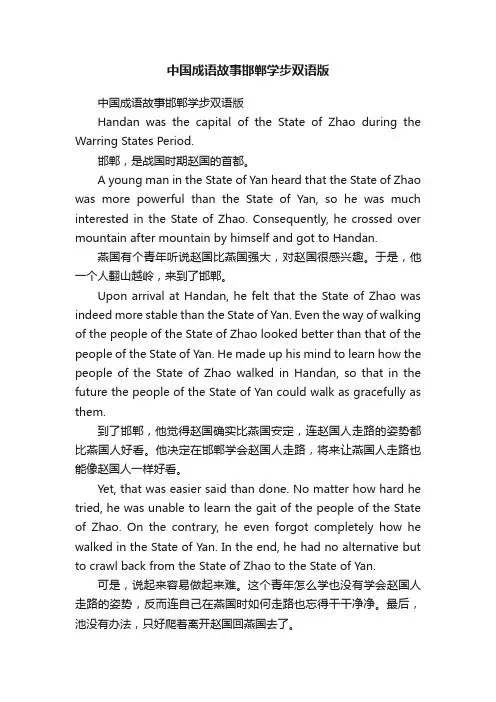
中国成语故事邯郸学步双语版中国成语故事邯郸学步双语版Handan was the capital of the State of Zhao during the Warring States Period.邯郸,是战国时期赵国的首都。
A young man in the State of Yan heard that the State of Zhao was more powerful than the State of Yan, so he was much interested in the State of Zhao. Consequently, he crossed over mountain after mountain by himself and got to Handan.燕国有个青年听说赵国比燕国强大,对赵国很感兴趣。
于是,他一个人翻山越岭,来到了邯郸。
Upon arrival at Handan, he felt that the State of Zhao was indeed more stable than the State of Yan. Even the way of walking of the people of the State of Zhao looked better than that of the people of the State of Yan. He made up his mind to learn how the people of the State of Zhao walked in Handan, so that in the future the people of the State of Yan could walk as gracefully as them.到了邯郸,他觉得赵国确实比燕国安定,连赵国人走路的姿势都比燕国人好看。

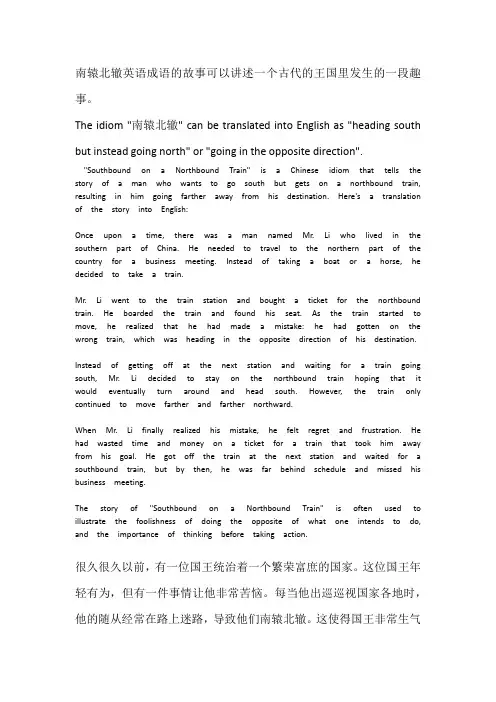
南辕北辙英语成语的故事可以讲述一个古代的王国里发生的一段趣事。
The idiom "南辕北辙" can be translated into English as "heading south but instead going north" or "going in the opposite direction"."Southbound on a Northbound Train" is a Chinese idiom that tells the story of a man who wants to go south but gets on a northbound train, resulting in him going farther away from his destination. Here's a translation of the story into English:Once upon a time, there was a man named Mr. Li who lived in the southern part of China. He needed to travel to the northern part of the country for a business meeting. Instead of taking a boat or a horse, he decided to take a train.Mr. Li went to the train station and bought a ticket for the northbound train. He boarded the train and found his seat. As the train started to move, he realized that he had made a mistake: he had gotten on the wrong train, which was heading in the opposite direction of his destination.Instead of getting off at the next station and waiting for a train going south, Mr. Li decided to stay on the northbound train hoping that it would eventually turn around and head south. However, the train only continued to move farther and farther northward.When Mr. Li finally realized his mistake, he felt regret and frustration. He had wasted time and money on a ticket for a train that took him away from his goal. He got off the train at the next station and waited for a southbound train, but by then, he was far behind schedule and missed his business meeting.The story of "Southbound on a Northbound Train" is often used to illustrate the foolishness of doing the opposite of what one intends to do, and the importance of thinking before taking action.很久很久以前,有一位国王统治着一个繁荣富庶的国家。
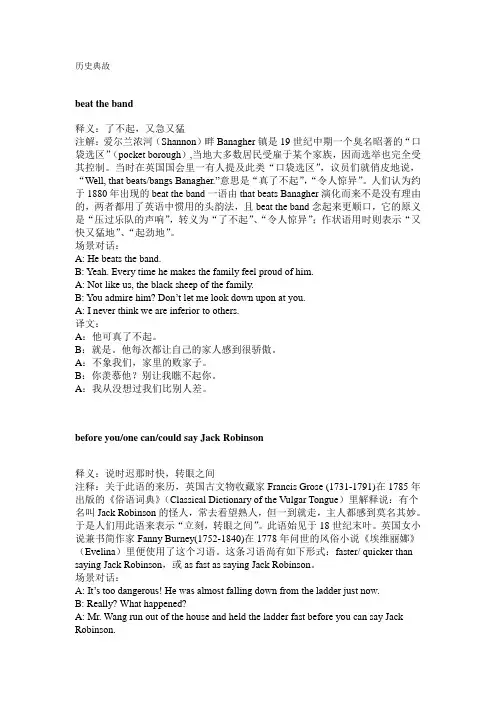
历史典故beat the band释义:了不起,又急又猛注解:爱尔兰浓河(Shannon)畔Banagher镇是19世纪中期一个臭名昭著的“口袋选区”(pocket borough),当地大多数居民受雇于某个家族,因而选举也完全受其控制。
当时在英国国会里一有人提及此类“口袋选区”,议员们就俏皮地说,“Well, that beats/bangs Banagher.”意思是“真了不起”,“令人惊异”。
人们认为约于1880年出现的beat the band一语由that beats Banagher演化而来不是没有理由的,两者都用了英语中惯用的头韵法,且beat the band念起来更顺口,它的原义是“压过乐队的声响”,转义为“了不起”、“令人惊异”;作状语用时则表示“又快又猛地”、“起劲地”。
场景对话:A: He beats the band.B: Yeah. Every time he makes the family feel proud of him.A: Not like us, the black sheep of the family.B: You admire him? Don’t let me look down upon at you.A: I never think we are inferior to others.译文:A:他可真了不起。
B:就是。
他每次都让自己的家人感到很骄傲。
A:不象我们,家里的败家子。
B:你羡慕他?别让我瞧不起你。
A:我从没想过我们比别人差。
before you/one can/could say Jack Robinson释义:说时迟那时快,转眼之间注释:关于此语的来历,英国古文物收藏家Francis Grose (1731-1791)在1785年出版的《俗语词典》(Classical Dictionary of the Vulgar Tongue)里解释说:有个名叫Jack Robinson的怪人,常去看望熟人,但一到就走,主人都感到莫名其妙。


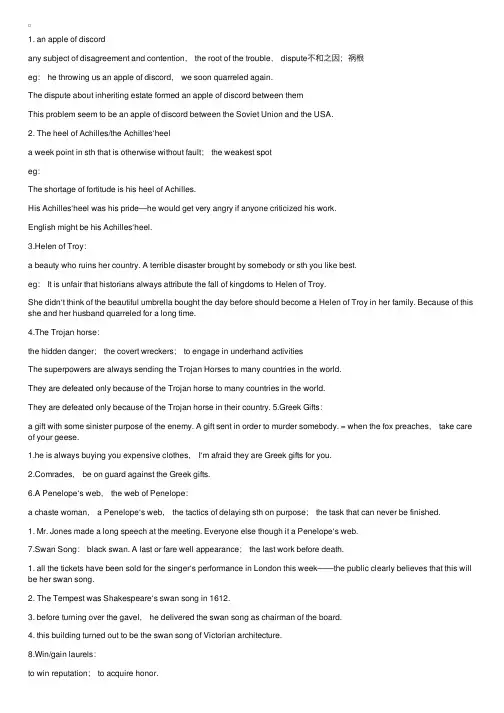
1. an apple of discordany subject of disagreement and contention, the root of the trouble, dispute不和之因;祸根eg: he throwing us an apple of discord, we soon quarreled again.The dispute about inheriting estate formed an apple of discord between themThis problem seem to be an apple of discord between the Soviet Union and the USA.2. The heel of Achilles/the Achilles‘heela week point in sth that is otherwise without fault; the weakest spoteg:The shortage of fortitude is his heel of Achilles.His Achilles‘heel was his pride—he would get very angry if anyone criticized his work.English might be his Achilles‘heel.3.Helen of Troy:a beauty who ruins her country. A terrible disaster brought by somebody or sth you like best.eg: It is unfair that historians always attribute the fall of kingdoms to Helen of Troy.She didn‘t think of the beautiful umbrella bought the day before should become a Helen of Troy in her family. Because of this she and her husband quarreled for a long time.4.The Trojan horse:the hidden danger; the covert wreckers; to engage in underhand activitiesThe superpowers are always sending the Trojan Horses to many countries in the world.They are defeated only because of the Trojan horse to many countries in the world.They are defeated only because of the Trojan horse in their country. 5.Greek Gifts:a gift with some sinister purpose of the enemy. A gift sent in order to murder somebody. = when the fox preaches, take care of your geese.1.he is always buying you expensive clothes, I‘m afraid they are Greek gifts for you.rades, be on guard against the Greek gifts.6.A Penelope‘s web, the web of Penelope:a chaste woman, a Penelope‘s web, the tactics of delaying sth on purpose; the task that can never be finished.1. Mr. Jones made a long speech at the meeting. Everyone else though it a Penelope‘s web.7.Swan Song: black swan. A last or fare well appearance; the last work before death.1. all the tickets have been sold for the singer‘s performance in London this week——the public clearly believes that this will be her swan song.2. The Tempest was Shakespeare‘s swan song in 1612.3. before turning over the gavel, he delivered the swan song as chairman of the board.4. this building turned out to be the swan song of Victorian architecture.8.Win/gain laurels:to win reputation; to acquire honor.9.To look to one‘s laurels:to beware of losing one‘s reputation; to keep one’s record from being beaten by others.卫冕。
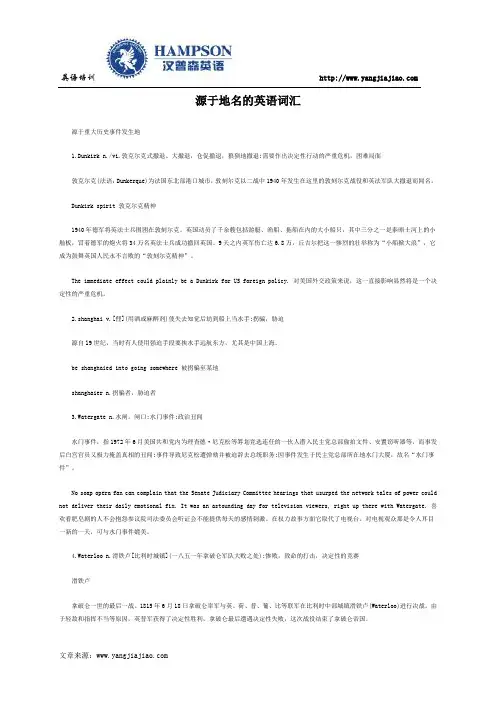
英语培训源于地名的英语词汇源于重大历史事件发生地1.Dunkirk n./vi.敦克尔克式撤退、大撤退,仓促撤退,狼狈地撤退;需要作出决定性行动的严重危机,困难局面敦克尔克(法语:Dunkerque)为法国东北部港口城市,敦刻尔克以二战中1940年发生在这里的敦刻尔克战役和英法军队大撤退而闻名。
Dunkirk spirit 敦克尔克精神1940年德军将英法士兵围困在敦刻尔克。
英国动员了千余艘包括游艇、渔船、拖船在内的大小船只,其中三分之一是泰晤士河上的小舢板,冒着德军的炮火将34万名英法士兵成功撤回英国。
9天之内英军伤亡达6.8万,丘吉尔把这一惨烈的壮举称为“小船掀大浪”,它成为鼓舞英国人民永不言败的“敦刻尔克精神”。
The immediate effect could plainly be a Dunkirk for US foreign policy. 对美国外交政策来说,这一直接影响显然将是一个决定性的严重危机。
2.shanghai v.[俚](用酒或麻醉剂)使失去知觉后劫到船上当水手;拐骗,胁迫源自l9世纪,当时有人使用强迫手段要挟水手远航东方,尤其是中国上海。
be shanghaied into going somewhere 被拐骗至某地shanghaier n.拐骗者,胁迫者3.Watergate n.水闸,闸口;水门事件;政治丑闻水门事件,指1972年6月美国共和党内为理查德·尼克松等筹划竞选连任的一伙人潜入民主党总部偷拍文件、安置窃听器等,而事发后白宫官员又极力掩盖真相的丑闻;事件导致尼克松遭弹劾并被迫辞去总统职务;因事件发生于民主党总部所在地水门大厦,故名“水门事件”。
No soap opera fan can complain that the Senate Judiciary Committee hearings that usurped the network tales of power could not deliver their daily emotional fix. It was an astounding day for television viewers, right up there with Watergate. 喜欢看肥皂剧的人不会抱怨参议院司法委员会听证会不能提供每天的感情刺激。
有关地名的英语成语典故篇一:常用英语地名阿富汗阿尔巴尼亚阿尔及利亚安道尔安哥拉安提瓜和巴布达阿根廷亚美尼亚澳大利亚奥地利阿塞摆疆巴哈马巴林孟加拉巴巴多斯白俄罗斯比利时伯利兹贝宁不丹玻利维亚波斯尼亚和黑塞哥维那博茨瓦纳巴西文莱保加利亚布基纳法索布隆迪柬埔寨喀麦隆加拿大佛得角中非乍得智利中国哥伦比亚科摩罗刚果(金)(-)刚果哥斯达黎加科特迪瓦'克罗地亚古巴塞浦路斯捷克前捷克斯洛伐克丹麦吉布提多米尼克多米尼加东帝汶厄瓜多尔埃及赤道几内亚厄立特里亚爱沙尼亚埃塞俄比亚欧洲联盟()斐济芬兰法国加蓬冈比亚格鲁吉亚德国前东德加纳希腊格林纳达危地马拉几内亚比绍-几内亚圭亚那海地洪都拉斯匈牙利冰岛印度印度尼西亚伊朗伊拉克爱尔兰以色列意大利牙买加日本约旦哈萨克斯坦肯尼亚基里巴斯朝鲜()韩国()科威特吉尔吉斯斯坦老挝拉脱维亚黎巴嫩莱索托利比里亚利比亚列支敦士登立陶宛卢森堡马其顿马达加斯加马拉维马来西亚马尔代夫马里马尔他马绍尔群岛毛里塔尼亚毛里求斯墨西哥麦克罗尼西亚摩尔多瓦摩纳哥蒙古摩洛哥莫桑比克缅甸纳米比亚北大西洋公约组织()瑙鲁尼泊尔荷兰新西兰尼加拉瓜尼日尔尼日利亚挪威阿曼巴基斯坦帕劳巴勒斯坦巴拿马巴布亚新几内亚巴拉圭秘鲁菲律宾波兰葡萄牙卡塔尔罗马尼亚俄罗斯前苏联卢旺达圣基茨和尼维斯-圣卢西亚圣文森特和格林纳丁斯萨尔瓦多萨摩亚圣马力诺圣多美和普林西比沙特阿拉伯塞内加尔塞舌尔塞拉利昂新加坡斯洛伐克斯洛文尼亚所罗门群岛索马里南非西班牙斯里兰卡苏丹苏里南斯威士兰瑞典瑞士叙利亚塔吉克斯坦坦桑尼亚泰国多哥汤加特立尼达和多巴哥突尼斯土耳其土库曼斯坦图瓦卢乌干达乌克兰阿拉伯联合酋长国英国北爱尔兰联合国组织()乌拉圭美国()波多黎各乌兹别克斯坦瓦努阿图梵蒂冈委内瑞拉越南()前南越也门前北也门前南也门南斯拉夫前南斯拉夫篇二:有关地名成语上有关地名的成语(上)1五湖四海:五湖指波阳湖、洞庭湖、洪择湖、太湖、巢湖五大湖泊;四海指东海、西海、南海、北海。
【优质文档】快活之城和罪恶之城英语词汇典故-word范文本文部分内容来自网络整理,本司不为其真实性负责,如有异议或侵权请及时联系,本司将立即删除!== 本文为word格式,下载后可方便编辑和修改! ==快活之城和罪恶之城英语词汇典故The Big Easy and Sin CityNow, the VOA Special English program Words and Their Stories.Many cities have interesting nicknames. Nicknames can help establish the identity of a city. They can also spread pride amongits citizens.New Orleans, Louisiana probably has more nicknames than any other American city. One web site lists more than twenty nicknames. The most famous is "The Big Easy." It describes the gentle, slow andeasy-going way of life in New Orleans.So how did the city get this nickname? In the early 1900s there was a dance hall in New Orleans called "The Big Easy." But the nickname did not become famous until the early 1970s. That was when a Louisiana newspaper writer began calling New Orleans by this name. She compared the easy-going way of life there to the hurried pace of life in New York City.In 1970, James Conaway wrote a crime novel called "The Big Easy." The story was set in New Orleans. In 1987, that book was made into a film which made the nickname even more popular.New Orleans has other nicknames. One of them is "The Crescent City." During the 19th century, new neighborhoods expanded out from what is now known as the French Quarter. These areas followed the great curve of the Mississippi River, giving New Orleans the shape of a crescent.Another nickname is "The Birthplace of Jazz," because that kind of music started in New Orleans. It is also called "Mardi Gras City" for the wild celebrations and parades that take place there every year. And, there is a nickname that uses the short way to write New。
高山流水(gāo shān liú shuǐ)Finding Source of Inspiration It may sound bizarre if someone likens a good friend or wonderful music to Gao Shan Liu Shui, or "highmountains and flowing rivers."However, this popular Chinese idiom comes from a touchingstory about Yu Boya, a legendary virtuoso of guqin(a seven-stringed plucked instrument similar to a zither).Yu lived during the Spring and Autumn Period (770-476 BC) and when he was young, Yu loved playing guqin.He later became a student of Cheng Lian, the best guqin player of the time.Under Cheng's tutoring, Yu made remarkable progress and after three years of practice he had almostmastered the instrument.However, Yu felt that he still wasn't a real guqinvirtuoso and could not use it to express his feelings freely.One day, Cheng told his student: "I have taught you whatever I know, but I can see that you aren't quitesatisfied. So, I'll recommend you to another teacher who can bring your playing to perfection."Next morning, Cheng took Yu to the top of a mountain cliff overlooking the sea. "You wait here and your newinstructor will arrive in a few minutes." Then Cheng went away leaving Yu aloneon the top of the mountain.Yu waited and waited, but no one showed up. Then, gradually, he became enthralled by the sound of the seawaves crashing on the rocks below and the singing of the birds and whispering leaves in the nearby woods.When the sun began to set, it suddenly dawned upon Yu that the new instructor recommended by Cheng wasnone other than nature herself. Yu realized that only by learning from nature could he gain virtuosity of theinstrument. So, he found an inexhaustible source of inspiration and energy.Yu finally reached the level of perfection he had sought and became the best guqinplayer of his time. Butbecause of the profundity of his musical works, Yu found few people who could really understand them. Onlyhis bosom friend, Zhong Ziqi, could actually appreciate his talent and performances.When Yu was playing a new tune one day, Zhong became very excited. He said: "It's wonderful, I can see loftyMount Tai in front of me." Then Yu played another tune and Zhong clapped his hands, saying: "Bravo! It's justas melodious as the flowing rivers."Since then, people use "high mountains and flowing rivers" to describe a soul mate like Zhong Ziqi orwonderful music such as the works created by Yu Boya.。
老马识途(lǎo mǎ shí tú)Trust an Old HorseHorses have been very helpful friends to man for aeons. They have not only provided valuable services, butpassion and delight as well. In addition, they are responsible for many widely-quoted expressions and phrasesin many languages.The popular Chinese saying, Lao Ma Shi Tu or "an old horse knows the way" seems only to be describingsomething of the natural character of the animal.But the story behind this expression tells how an old horse actually saved the lives of thousands of soldiers.In 633 BC, Duke Huan of the State of Qi led a large army to invade the Guzhu Kingdom.The invasion was successful, but it took a long time because of the great distances involved and the complexlocal geography. So when the Qi troops finally were able to return in triumph, it was already winter.The biting cold of the winter had deprived the fields and hills of their vegetation and, thus, the surroundingscenery had quite changed. Very soon, the entire Qi army found itself lost in a deep valley.Half a dozen teams of scouts were sent out to find ways home, but all failed their mission.After a few days, the duke became impatient and worried they might never find their way back. So, hesummoned his advisers to find a solution. The heated discussion led nowhere.Finally, Guan Zhong, a sharp-minded and resourceful military advisor, stood up and said: "Someone told meonce that old horses always know their way home."Why not find an old horse that had been serving the army since the very beginning of this expedition and letit play the role of our guide?"They found just one such horse which, miraculously, led the distressed and exhausted troops out of the deepvalley througha winding, bumpy path.The story was the genesis of the Chinese idiom, Lao Ma Shi Tu, which today is often cited to describe peoplewho are very experienced or those who know the ropes and have the knowledge of a veteran.。
中华成语故事英语版世外桃源During the Eastern Jin Dynasty, there was an old fisherman in Wuling. One day, he took his boat out to go fishing. As the boat floated downstream, the fisherman lost his way. Suddenly, a beautiful forest of peach trees with flowers in full bloom caught his eyes. He carried on sailing to the end of the forest where he found a mountain with a small cave at its foot. After the fisherman walked through the cave, a new world opened up before him. The people seemed happy and gentle, and lived peaceful lives with no arguments or disputes. The old rested quietly while the young played happily. Unlike the world东晋年间,武陵有一个老渔夫。
一天,他驾着渔船出去打鱼。
船沿着溪水行驶,老渔夫不知怎么迷了路。
忽然,一片美丽的桃花林出现在他眼前。
渔夫觉得很奇怪,继续往前寻找桃花林的尽头。
树林的尽头是一座山,山脚下有个小洞。
渔夫穿过了山洞,竟然看到了另外一个世界。
outside the cave, there was no conflict or turbulence. When they saw the fisherman, the people asked him not to tell others what he had seen there.那里的人们过着幸福安宁的生活,大家和睦相处,没有纷争,老人们安静地休息,儿童愉快地玩耍,没有外界那样动荡不安。
有关地名的英语成语典故
To meet Waterloo(倒霉,受毁灭性打击,灭顶之灾)滑铁卢是一代天骄拿破仑遭受残败的地方。
遭遇滑铁卢,对一个人来说,后果不堪设想。
无怪据说二战期间,在准备诺曼底反攻时,温斯顿·丘吉尔和随员冒雨去某地开会,其随员因路滑而摔了一跤,脱口说一句“To meet Waterloo!”丘吉尔竟联想到拿破仑兵败滑铁卢的典故,恼怒地斥责他:“胡说!我要去凯旋门呢!”
It's Greek to me.(我不知道)
英国人一般都不懂希腊语。
这句话的直译是:对于我这是希腊语。
自然是不明白的意思。
Greek Kalends(幽默,诙谐方式表达的永远不)Kalends是罗马日历的第一天。
古希腊不用罗马日历,永远不会有这一天。
Castle in Spain(西班牙城堡,幻想,梦想。
相当于汉语中的空中楼阁)中世纪某一时期,西班牙是一个颇富浪漫色彩的国家,这句成语是和Castle in air(空中城堡)相齐名的。
Set the Thames on fire(火烧泰晤士河,这是何等伟大的壮举)但是这句成语经常是反其义应用,指那些人对某事只是夸下海口,而不是真正想去做
From China to Peru(从中国到秘鲁)它的意义非常明白,指从世界的这一边到世界的那一边,相当于汉语的远隔重洋。
Between Scylla and Charybdis(锡拉和卡津布迪斯之间———在两个同样危险的事物之间:一个人逃出一种危险,而又落入另一种危险)锡拉是传说中生活在意大利岩石的怪兽,卡津布迪斯是住在海峡中一端经常产生旋涡的另一个怪兽。
水手为了躲避其中一个的危害,而常又落入另一个灾难。
意大利这一方的海角叫凯尼斯(Caenys),西西里岛那一方的海角叫皮罗鲁姆(Pelorum)。
Spoil Egyptians(掠夺埃及———迫使敌人提供自己所需要的东西)源于圣经:上帝答应摩西,埃及人必须借给以色列他们所需要的东西。
Do in Rome as Romans Do(在罗马,就按罗马人的方式办)和我们的入乡随俗的意思一样。
Carry Coals to Newcastle(把煤送到纽卡斯尔)把某种东西送到一个人们根本不需要的地方。
纽卡斯尔盛产煤,送煤到那里,岂不是多此一举。
有趣的是法国也有类似的成语“del'eau a la riviere(送水到大河里)。
”。